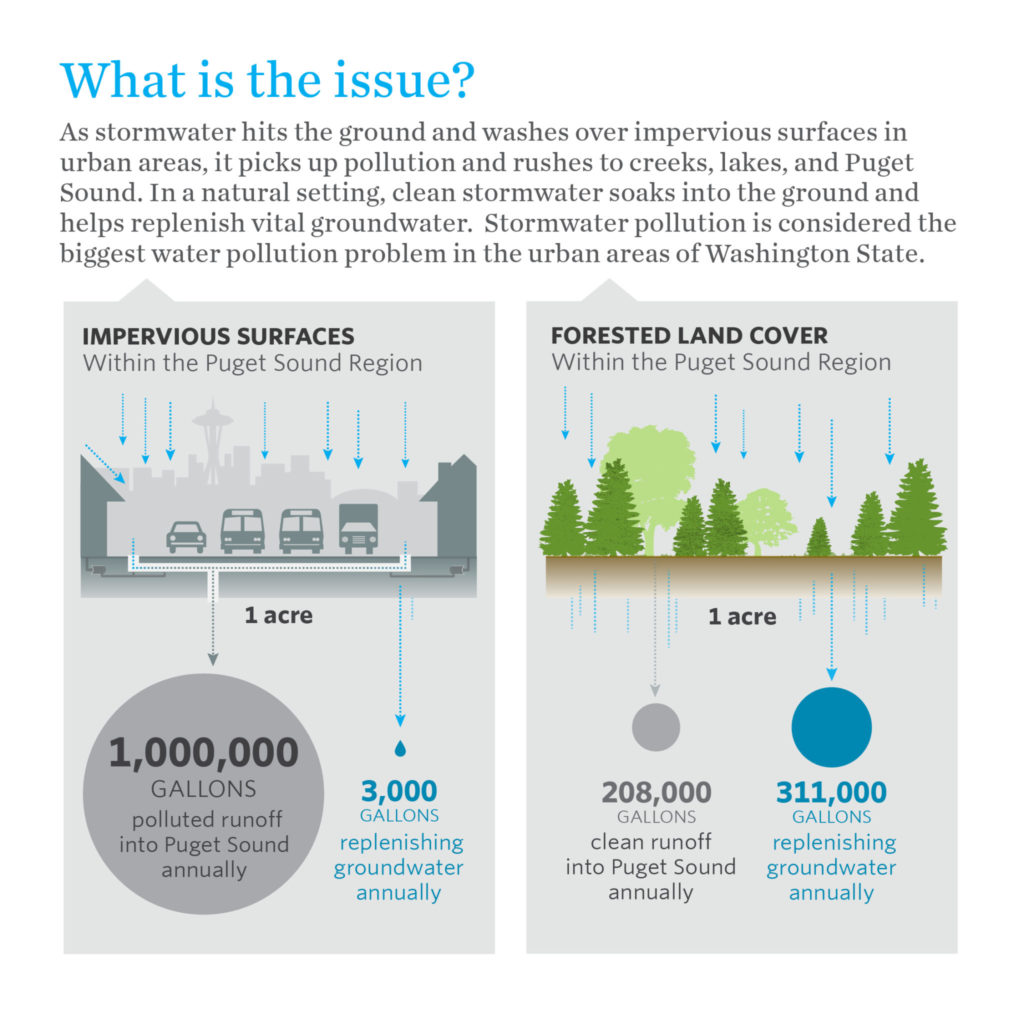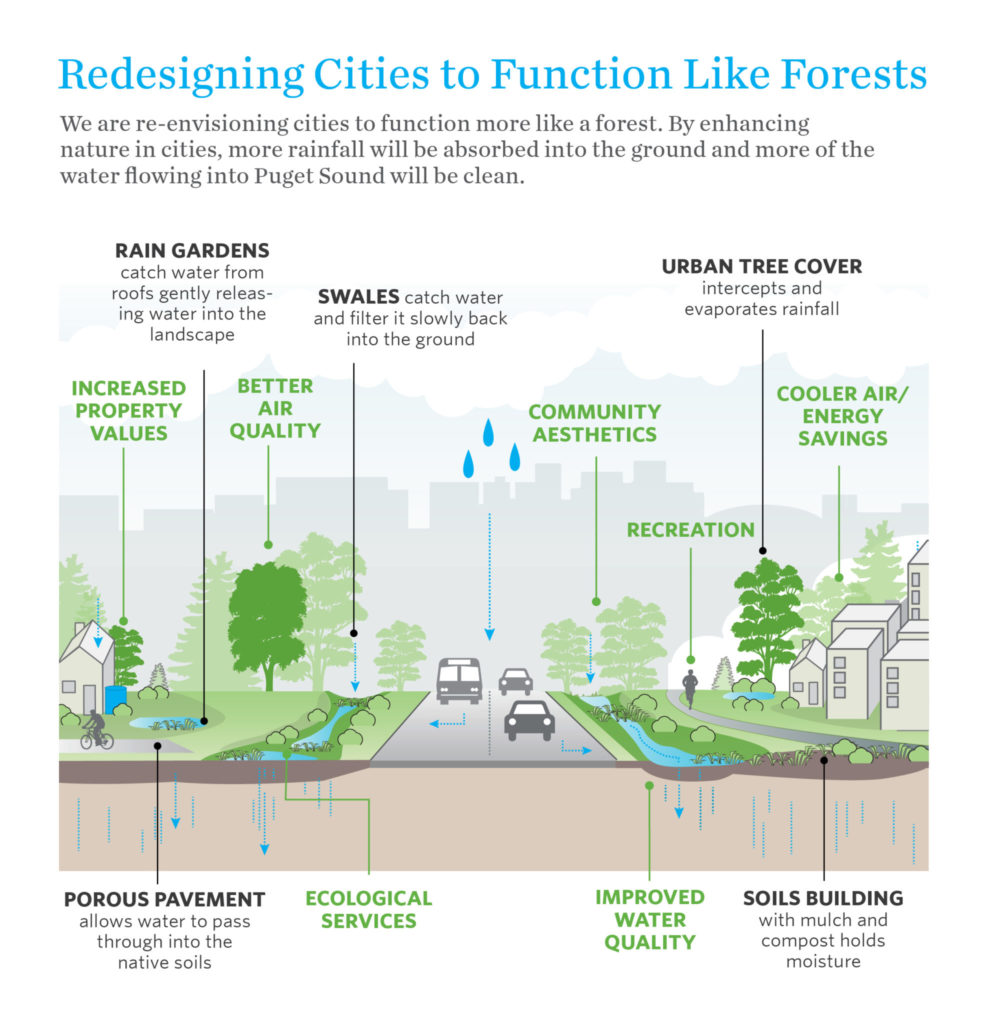
- Rainwater soaks into the ground where it is soaked up by plants, replenishes the ground water, and slowly feeds creeks, lakes and rivers.
- Rainwater quickly runs off hard surfaces such as rooftops, driveways, and roads. Because there are fewer plants and trees, not much water can soak in or evaporate.
- To prevent flooding, much of this urban water travels through a large network of ditches, gutters, drains, and pipes. These pipes usually drain directly to the nearest creek, river, lake, or the sea without any treatment.
- Habitat is damaged when the stormwater overwhelms creeks, changing the shape of the creek bed and eroding the slopes. Flooding in creeks can flush away salmon redds (nests) and juvenile salmon.
- When water runs straight off hard surfaces like parking lots it can also be heated up by the warm pavement. Warmer creek temperatures can reduce the amount of oxygen in the water, harming fish and other aquatic life.
- The rainwater picks up and carries pollutants off our yards, parking lots, and streets
- Pesticides and fertilizers from yards and gardens
- Dog poop left in yards and parks
- Oil and gas leaks, heavy metals, and car wash soap from driveways and roads
- Sediment from exposed dirt and eroding slopes
- Litter such as cigarette butts and plastics
- Nutrients from fertilizers, leaves, pet waste, and sediment
- And others
- Pesticides can kill plants and animals that live in and near water.
- Dog poop contains germs that spread diseases to people and pets, including giardia, roundworms, and E. coli. When fecal bacteria get into creeks and lakes, the water is considered unsafe for recreation or fishing. When high levels of fecal bacteria are found in the sea, shellfish beds are closed for harvesting.
- Oil, gas, and other vehicle fluids from cars are toxic to fish and wildlife.
- Car wash soap, even biodegradable soap, strips the protective coating from fish causing them to suffocate or get sick more easily. Wash water can contain
- Heavy metals, such as lead, copper (from car brakes), and zinc can disrupt the natural behaviors of salmon, causing them to be more easily found by predators or to lose their ability to navigate to spawning creeks.
- Sediment makes the water cloudy, suffocating fish and smothering their habitats, and limiting the sunlight aquatic plants need to grow.
- Litter is unsightly and often ends up in the ocean where it very slowly breaks down or is eaten by fish and other creatures.
- Nutrients such as phosphates and nitrogen can contribute to troublesome algae blooms in our lakes. These algae can clog up our drinking water systems.
- Practice natural yard care. Use alternatives to pesticides, and if you do use them, be sure to use them properly. Build healthy soil. Plant right for your site. Practice natural lawn care and smart watering. www.NaturalYardCare.org
- Scoop dog poop at home at least weekly, ideally daily. On walks, bring extra bags, keep an eye on your dog, and scoop every poop. Put bagged dog poop in the trash. www.cob.org/ScoopPoop
- Check for car leaks regularly and get them fixed as soon as possible. www.FixCarLeaks.org
- Use a commercial car wash, or, if you must wash at home, use biodegradable soap, use as little water as possible, and park where the wash water can soak into the ground.
- Spills happen. Help us find them. Call the pollution hotline at (360) 778-7979 or enter info at www.cob.org/SpillsHotline
- Find more tips and information at www.cob.org/CleanWater.
- We are building systems that mimic nature’s ability to filter pollutants and release water slowly. The Stormwater Discovery Tour highlights the different types of systems designed by engineers to mimic nature. By using various design techniques, these systems allow stormwater to soak in, filter, store, and evaporate stormwater runoff at or close to where it’s generated. Developers and private land owners are required to do this too.
- Many of these facilities, particularly those that include plants, provide beauty, habitat, recreation opportunities, increased property values, improved air quality, and climate benefits including carbon capture and reduced urban heat island effects.
